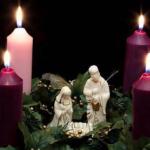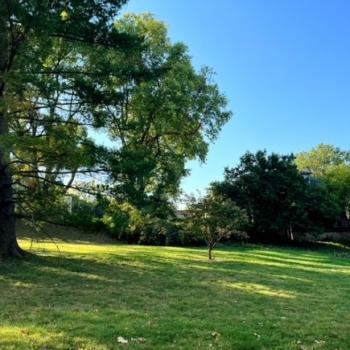ADVENT IS COMING—3 of 4—Prayer, Devotion, Meditation, and Contemplation
Advent means “to come to” or “toward” and is filled with a sense of expectation and hope. But most years, we get too busy, scattered, and jaded to allow the season to have a life of its own. In this four-part series, I give a little background and a few ideas that might help you stop, breathe, and become a part of the anticipation of Christmas.
What’s the Difference Between Prayer, Devotion, Meditation, and Contemplation?
Many people confuse these (and other) terms into one mash of the same thing. Let’s clarify.
PRAYER—is a “vital and personal relationship with the living and true God (from the Catechism of the Catholic Church par. 2558). In short, prayer is an ongoing conversation with God and sometimes being closer to Him or saints, angels, etc. Do not confuse “prayer” with “worship!” Worship is left to and for God alone (as explained later). Prayer is like anything else in life; the more time, energy, and devotion you put into it, the more you get out of it. But remember, prayer is a conversation, so you need to listen as much as you talk! You need to leave some quiet time to listen to that deep inner voice communicate with you; otherwise, all you’re doing is “telling”—not “praying.”
Here’s an idea for a prayer formula you might find helpful. Think of the acronym A.C.T.S.
- Adoration—Praise God and His gift of love to you. This is an excellent time to remind God that He is the most critical force in your life.
- Confession—You are coming to God mentally as His child. You must have no roadblocks between you two to become closer to Him. Ask for forgiveness for anything you have done that would separate you and God’s love.
- Thanksgiving—Thank God for His forgiveness and understanding. Thank Him for all He has given you—friends, family, talents, etc.—is an excellent place to start. I usually come up with at least ten things.
- Supplication—is another word for “intention” or “asking.” I usually start by asking for His help for friends, family, and people who have asked me to pray for them. I pray that God’s will be done in their lives and that He acts gently with them. I then have a mental “chat” with God. He already knows my needs. But now we get to open to one another, and he gets to know what’s on my mind and heart. And, with time and silence, I will get a reply. No, not a big booming voice or a lightning strike. But an inner “knowing” that is very distinct that God is communicating something to me. This takes time and practice, so… Keep working!
DEVOTIONS—are expressions of our love of God through various forms of prayers and service. It’s a way of regimenting your time and thoughts to create an opening to communicate with God. There are many, many preexisting devotions to choose from, so explore! A few are:
- Chaplet prayers—are prayers with a set of beads. They usually consist of an opening prayer to center the mind, heart, and spirit, followed by supplications, salutations, or invocations, and then a closing prayer. During the recitation of the prayers, let your mind concentrate on a single scene—typically from the life of Jesus—and begin to meditate on that scene to understand more of Jesus’s life. There are many different forms of chaplet prayers. A good resource for chaplet prayers is A Treasure of 59 Chaplet Devotions (catholicdoors.com).
- Eucharistic Adoration—Adoration is just that: we adore and focus on God. During a time of adoration in the church, the body of Christ is put into a vessel called a monstrance or monstrare, meaning “to show” or “to expose.” This is a time for you to be “eye to eye” (so to speak) with God. It’s a time that you can be in His physical and ethereal presence as best as we humans can know in this life. What do you do while you are in God’s presence? Many people pray others read scripture or devotional, and others follow Saint John Vianney’s lead. When asked what happens when sitting before the exposed host on the altar, he said, “Oh, I look at Him [God], and He looks at me.”
- Scripture Reading—is a great way to get to know Jesus, God, and His relationship with us. Many people begin their practice of reading Sacred Scripture during the holidays. A good rule of thumb is to set aside the same amount of time and at the same time daily. The reason? You’re trying to start a good habit. To do that, there needs to be some regularity. Some great Sacred Scriptures are at Daily Scripture Readings for Advent – Advent & Christmas Season – Catholic Online.
- Lectio Divina (Divine Reading)—is taking a short passage—maybe from the Sacred Scripture reading of the day—and reading it several times slowly. It can be aloud or silent; that’s your choice. As you read the passage several times, look to what word or phrase jumps out at you and think about that single word or phrase for a time. Ask yourself why it strikes you. Why did it stick in your mind? Is there something you can learn from it? Is God trying to tell you something? Lectio Divina can take as long as you have or need it to. It can be five minutes, fifteen minutes, or an hour. You choose how long you want or need.
- Divine Liturgy or the Liturgy of the Hours—is called the “Daily prayer of the Church.” Everyone is called to do it, although those in religious orders are called to do it daily. They were developed over hundreds of years into a series of hymns, psalms, and readings on a set schedule throughout the day by the desert fathers and in monasteries. The Divine Liturgy is segmented into approximately three hours sections throughout the day and night in response to the passage from 1 Thessalonians 5: 17 that we are to “pray without ceasing.” The sections are:
- Lauds (3 am)
- Prime (6 am)
- Terce (9 am)
- Sext (noon)
- None (3 pm)
- Vespers (evening)
- Compline (before going to bed)
- Matins (Midnight)
MEDITATION is, above all, a quest. The mind seeks to understand the why and how of the Christian life, in order to adhere and respond to what the Lord is asking (from the Catechism of the Catholic Church par. 2705). Meditation is not just a practice that comes from the East. Desert fathers and mothers have been doing it for hundreds of years. Meditation allows you to relax and slow your mind and system to a point where you can focus on a greater awareness. Helpful byproducts may be reduced anxiety and increased sense of well-being. A tremendous step-by-step resource is from The Ultimate Catholic Guide to Meditation – Catholic World Mission. Other forms we have already discussed are:
- Lectio Divina (Divine Reading)—is taking a short passage—maybe from the Sacred Scripture reading of the day—and reading it several times slowly. It can be aloud or silent; that’s your choice. As you read the passage several times, look to what word or phrase jumps out at you and think about that single word or phrase for a time. Ask yourself why it strikes you. Why did it stick in your mind? Is there something you can learn from it? Is God trying to tell you something? Lectio Divina can take as long as you have or need it to. It can be five minutes, fifteen minutes, or an hour. You choose how long you want or need.
- Chaplet prayers—please see above in the DEVOTIONS
CONTEMPLATION—is a gaze of faith, fixed on Jesus… [it] also turns its gaze on the mysteries of the life of Christ. Thus, it learns the “interior knowledge of our Lord” (Saint John Vianney), the more to love and follow Him (from the Catechism of the Catholic Church par. 2715).
In short, contemplation is fixing your mind on a situation or event in Jesus’s life, then mentally and spiritually exploring what His life was like. What things were happening around him, and how did He or others react? You come to know the Christ through the imagination God gave you.
What Prayer, Devotion, Meditation, and Contemplation are NOT.
ADORATION is the praise of and for God alone. It is a devoted time of focus on all God has done and given you and giving profound thanks.
WORSHIP is adoration and honor given to God [alone]. (from the Catechism of the Catholic Church glossary). Worship is setting God above all things, people, or ideals you may have.
How Much Time DO You Have?
Be honest. We are all busy, especially during the Holidays. Presents to ferret out, buy, and wrap. Parties, get-togethers, and soirees to attend. Pageants, concerts, and recitals abound and take up our precious time. So, how much time can you dedicate to a single practice to enrich your and possibly your family’s life? Be brutally honest. Do not set yourself up to fail. If it’s only five minutes a day, great! Maybe 10 minutes a week, spectacular! The key is to try to be totally present (pun intended) for those few minutes.
Set Your Time and Day.
I set an alarm on my phone for the same time each day to do my devotionals. It takes the responsibility off me and puts it where it belongs, on an electronic assistant. So now that you know how much time you have, let’s dig into some fun and fulfilling ways to deepen your Advent walk.
Choose Wisely.
Above are different devotionals, practices, readings, and activities you can do to enrich your or your family’s Advent journey. But they come with caution, start small, and grow. Don’t pick all the items or overload your shopping basket with a thousand dollars of goodness. You will burn your non-violet and rose candles at both ends during this season. Don’t add to the crazy! This is a time for reflection and peace.
What Are Your Ideas?
Remember, these practices are a personal way of connecting with the season. There is no right or wrong answer. So, explore and become more at peace during this Advent Season. And as always, I love hearing from you! What are some of your ideas? Please let me know! Happy Advent Season!














